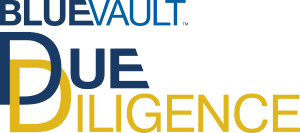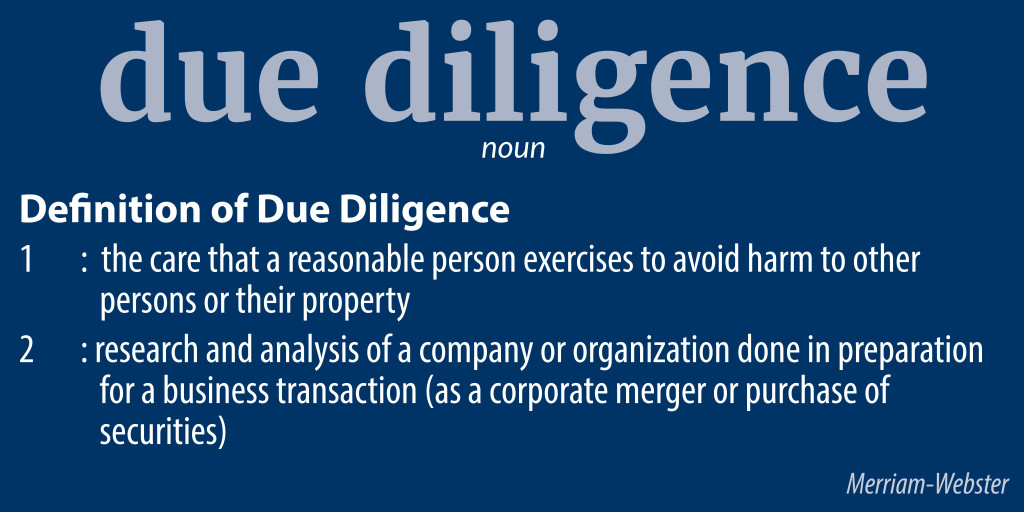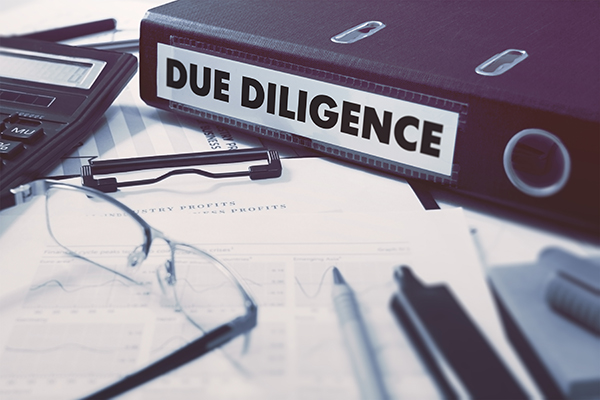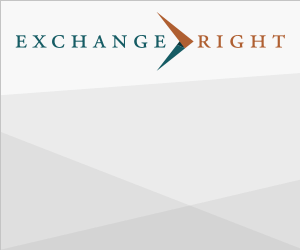Doing Your Due Diligence
September 21, 2016 | by Beth Glavosek and Alan Royalty | Blue Vault and Blue Vault Due Diligence Services
According to Merriam-Webster, the term ‘due diligence’ has been used since at least the 15th century to mean putting forth a requisite effort to gather information in a prudent fashion. “Doing your due diligence” means that you’ve put reasonable care into avoiding harm when making an important decision.
Through the years, due diligence has taken on special significance in legal and business contexts, as the term applies to research one might perform before engaging in a financial transaction or making a purchase.
In the world of investments, due diligence is particularly necessary in order to gain confidence in the stability and integrity of a product sponsor and its offerings. In securities law, due diligence describes the duty of care and review to be exercised in connection with evaluating public offerings of securities.[1] For example, the officers, directors, underwriters, and other leadership of Independent Broker Dealers perform due diligence on product offerings they’re considering making available to investors.
Authors Stanley Foster Reed and Alexandra Reed Lajoux offer a rather poetic description of the importance of due diligence:
 “Due diligence – the search to discover hidden defects and risks – restrains the desire to see the best in each other…and it should. To ensure a lasting union, due diligence must arrive on the scene early and linger long, getting behind the reflected surface of things, looking for signs of trouble, asking always ‘What if?’ Without such deep, dark searching, there can be no true light or clarity that can help all parties move forward with mutual confidence from idea to reality.”
“Due diligence – the search to discover hidden defects and risks – restrains the desire to see the best in each other…and it should. To ensure a lasting union, due diligence must arrive on the scene early and linger long, getting behind the reflected surface of things, looking for signs of trouble, asking always ‘What if?’ Without such deep, dark searching, there can be no true light or clarity that can help all parties move forward with mutual confidence from idea to reality.”
However, with the proliferation of today’s investment choices, it can be daunting to perform in-depth analysis of the industry. An unbiased investment research report produced by a third-party due diligence firm like Blue Vault Due Diligence Services is an invaluable, time-saving resource that can provide great peace of mind as these busy firms are gathering information on many different products.
With that in mind, let’s answer some common questions about the due diligence process.
With regard to alternative investments, what is third-party due diligence?
It’s incumbent upon Independent Broker Dealers to thoroughly evaluate alternative investment offerings. In fact, the Financial Industry Regulatory Authority (FINRA) states that, “A Broker Dealer has a duty—enforceable under federal securities laws and FINRA rules—to conduct a reasonable investigation of securities that it recommends.”
A third-party due diligence firm is an essential tool in helping a Broker Dealer evaluate a product sponsor as part of its due diligence on the sponsor’s alternative investment offerings. As part of the process, the Broker Dealer obtains an investment research report produced by the third-party due diligence firm to aid their evaluation.
Who engages a third-party due diligence firm, an independent Broker Dealer or a product sponsor?
It depends. In some cases, independent Broker Dealers prefer to engage a third-party due diligence firm directly in order to minimize conflicts of interest. The engagement proceeds with the understanding that a third-party due diligence firm’s fees and expenses may be reimbursed by the product sponsor, who may subsequently be reimbursed by the alternative investment product itself.
In other instances, a product sponsor may engage a third-party due diligence firm directly to perform a due diligence review of its alternative investment offering. The product sponsor then notifies Independent Broker Dealers that it does business with that a due diligence firm will produce an investment research report that will be available upon request.
An important distinction that must be made is that independent Broker Dealers, not product sponsors, are the actual clients of a third-party due diligence firm.
Who is responsible for the reimbursement of bona fide due diligence fees and expenses in connection with a public offering of securities?
Although an investment research report by a third-party due diligence firm may be utilized by a number of Independent Broker Dealers in their evaluation of an alternative investment offering, product sponsors pay the bill for the cost of bona fide due diligence fees and expenses. Product sponsors may then be reimbursed by the sponsored investment product itself, so shareholders may ultimately bear the cost of due diligence. Bona fide due diligence expenses are limited by prospectus to a small percentage of gross offering proceeds.
How do Broker Dealers get started with the due diligence process of evaluating the offering, and what are the first steps?
- Broker Dealers initiate the process. When Broker Dealers are interested in considering a particular alternative investment product offering, they require the product sponsor to utilize a third-party due diligence firm like Blue Vault Due Diligence Services as a tool to assist them in evaluating the sponsored investment product.
- The process usually kicks off with an introductory conference call. During this call, a Broker Dealer and/or a third-party due diligence firm may review a list of documents or information requested from the sponsor’s due diligence team. This call usually takes place a few weeks before the Broker Dealer and/or third-party due diligence firm plans to make an on-site visit to the sponsor. At this time, a third-party firm can provide valuable assistance in determining what information to ask for, collecting the data requested, and evaluating it.
- The on-site visit will then be scheduled. It’s critical to make sure that the sponsor’s executives and key personnel will be available and accessible during this visit. If this is not the case, the on-site visit should be rescheduled. For example, the following sponsor and product personnel should be available for meetings, conversations, and follow-up questions during an on-site visit:
- President and Chief Executive Officer
- Chief Operating Officer
- Chief Financial Officer
- Chief Investment Officer
- Investment Committee members
- Acquisitions, Asset Management, Debt Capital Markets, and Portfolio Management personnel
Corporate Finance team members who maintain a product’s distributions model to monitor distributions coverage should be available so that the assumptions in a model may be understood and evaluated for reasonableness. A “live” version of the model should be made available to the due diligence firm so that sensitivity analyses that “stress test” the model may be completed. It’s particularly helpful to also have Legal & Compliance and Internal Audit personnel available. Team members in those areas often have a unique perspective on processes and internal controls that may be in place to mitigate risk.
- After the on-site visit is complete, it’s time for the third-party firm to prepare a due diligence report for the Broker Dealers. Blue Vault Due Diligence Services performs this function for its Broker Dealer clients. There will, undoubtedly, be follow-up questions and additional information requests for the sponsor as the report is drafted, and the third-party due diligence firm streamlines this process.
- The last step is issuing the completed due diligence report. Blue Vault Due Diligence Services typically schedules a conference call with the sponsor’s due diligence team once the report is ready to be finalized. The call reviews the report’s executive summary, strengths and weaknesses, and particular points with the sponsor’s due diligence team in order to ensure factual accuracy.
Once this call has been completed, any necessary resulting changes or edits are made to the due diligence report, and it is ready for issuance to Broker Dealer clients.
What documents, as applicable, should be requested and examined during due diligence for a product sponsor and for its sponsored alternative investment product?[2]
The following is a list of common documents requested during the due diligence process:
- Corporate Documents
- Certificate of Incorporation including all Amendments, Name Changes, Mergers
- Bylaws
- Minutes
- Financial Statements
- Engineering Reports
- Market Studies / Reports on Sponsor’s Product
- Key Tangibles
- Mortgages
- Title Documents to Real Estate and Personal Property
- Real Property and Assets Identification
- Contracts
- Sales Agreements
- Employment and Consulting Agreements
- Leases
- License and Franchise Agreements
- Loan Agreements
- Shareholder Agreements
- Sponsorship Agreements
- Management Agreements
- Security Agreements or Other Agreements Giving Other Parties the Right to Acquire Assets of the Company
- Selected Correspondence
- Acquisition Agreements
- Pension and Profit-Sharing Plans
- Welfare Benefit Plans
- Multiemployer Plans
- Deferred Compensation Plan and Stock Option Plans
- Supplemental or Excess Pension Plan
- Insurance Policies – Review All Policies and Ask the Following Questions
- Do policies cover the area of risk exposure?
- What is the deductible?
- What are the liability limits per occurrence? In total?
- Are punitive or treble damages excluded by the policy or by state law?
- Are policies written for “claims incurred” or “claims made”?
- Must a “tail” be purchased to extend coverage?
- Is there a “reservation of rights” clause?
- Is there a regulatory exemption clause?
- What about coverage for director and officer liability?
- What about environmental liability?
- Key Information from the Sponsor’s Management:
- Financial and Ownership Information (Sponsor)
- Financial Information
- Relative Profitability of the Company’s Various Classes of Products and Business Segments
- Ownership of Company’s Securities
- Litigation Matters
- Potential Defaults under Existing Contracts or Potential Litigation
- Recent or Pending Changes in Laws or Regulations That Might Affect the Company’s Business
- Pending Negotiations for the Purchase or Disposition of Assets or Liens
- Key Information from Outside Sources:
- Market and Capital Information
- Market and Product Studies
- Capital Confirmation
- Lien Search
- Ordering a Search
- Reviewing a Search
- Creditor Check
- Assumption of Debt
- Repayment of Debt
- Other Searches
- Certificates of Good Standing for all Corporate Subsidiaries
- Title Search/Acquisition of Title Insurance
- Appraisals of Company-Owned Real Property and Improvements
- Any Equipment Appraisals Made by or for Insurance Companies
- Market and Capital Information
How do you know that a due diligence process has been successful?
As one Broker Dealer put it, at the end of the day, three critical pillars or cornerstones of due diligence must remain front of mind. First, look at everything. Second, tell Broker Dealers everything. Third, always stay on the side of the Broker Dealer.
Perspectives on Effective Due Diligence:
- Stephen Hester, Kestra Financial: “Just getting a summary prospectus is not very helpful. Many third-party due diligence reports include little commentary other than what’s in a prospectus. Quarterly ongoing due diligence is lacking. Many Broker Dealers don’t have internal processes to do this very well. No commentary in third-party due diligence reports” is an issue that we face. Where we are in the real estate cycle is important. Are there more headwinds than tailwinds, or vice-versa? Getting the cycle wrong is what sinks these programs. It’s imperative that third-party reports are fair and balanced.”
- Jayme Barrett, ProEquities: “Include results of sensitivity analyses of a distributions model in due diligence reports. Can third-party reports provide more detail and results of sensitivity analyses of a distributions model? Include overall market and industry data.”
- Mike Pagano, 1st Global: “Prior performance must do more than simply restate data. How is the sponsor really doing compared to other product sponsors who, for example, had Reg D limited partnerships or Reg D 1031 Exchange offerings? How did the sponsor do on the acquisitions side versus fund-raising? For a value-add strategy buyer, for example, how are they doing? How does the sponsor achieve liquidity and performance of prior programs? Does their product with a value-add investment strategy that invested at a great time in the market, for example, generate internal rates of return that an investor would expect? Why or why not? The identification of such issues to Broker Dealers is very important.”
Other Insights from Broker Dealer Due Diligence Professionals:
“I like to see a footnote for the source of all facts and assertions in third-party due diligence reports. Ideally, prospectus language in a due diligence report should be cross-referenced to its page number in a prospectus. When something is characterized as reasonable, who and what is it compared to?
Regarding distribution coverage, Funds from Operations (FFO) and Cash Flow from Operations (CFO) are valid comparisons. Sufficient market analysis must back up all beliefs in a due diligence report. Indicate or display the ‘meat’ behind all assertions.
Few include commentary on an acquisition or a property – an investment – that’s gone wrong.
It’s important to remain completely neutral with language and bias in a third-party report. I believe that no conclusion in a third-party due diligence report is better for the industry because it allows a due diligence analyst at a Broker Dealer to make up his own mind.
Product sponsors must be able to answer ‘What are you providing in return for illiquidity?’ Due diligence reports should indicate how a sponsor responded to this question.”
“Third-party due diligence is one of the tools we use for an evaluation of an alternative investment offering. It is the eyes and ears for the Broker Dealer.”
“Third-party due diligence reports are often too much of a recitation of a prospectus. This is frustrating. I want to see something different.”
Items that Broker Dealers Would Like to See in a Due Diligence Report
- Market and industry research comparing a particular product to its peers in the market
- How the program under review compares to other programs in terms of fees
- The expected Internal Rate of Return (IRR) in each share class
- Potential risks, and are mitigants adequate?
- Highlights of the environment, sector or market
- Commentary, input, and opinion on sponsor processes – ideally benchmarked to industry standards
- What a product sponsor is doing well
- Examples of an investment committee or board of directors turning down an acquisition and why
- Prior performance, but use caution with forward-looking statements
- Sponsor assumptions “stress tested” in a distributions coverage model
- Sponsor reactions to constructive comments and suggestions
- Quarterly due diligence calls for products already reviewed
Items of importance to Broker Dealers in the due diligence process run the gamut. It’s clear that effective due diligence isn’t just an initial effort – it’s an ongoing, living, breathing, and evolving exercise that spans the entire life of an alternative investment product. Although due diligence may be an ever changing process, its objective – a search to discover hidden defects and risks in the best interests of independent Broker Dealers and their clients – remains never changing.
About the Authors
Alan Royalty is a Managing Partner of Blue Vault Due Diligence  Services, LLC. Blue Vault Due Diligence Services, LLC is an independent, third-party provider of due diligence research on alternative investment products such as nontraded REITs, nontraded BDCs, interval and daily NAV funds, and private placement offerings to independent Broker Dealer clients.
Services, LLC. Blue Vault Due Diligence Services, LLC is an independent, third-party provider of due diligence research on alternative investment products such as nontraded REITs, nontraded BDCs, interval and daily NAV funds, and private placement offerings to independent Broker Dealer clients.
Beth Glavosek is a freelance writer who specializes in creating communications targeted to the investor and financial professional communities.
[1] [2] Stanley Foster Reed and Alexandra Reed Lajoux. The Art of M&A, A Merger Acquisition Buyout Guide (Third Edition).
**Insights are exclusive “Subscriber Only” content. NewsWire recipients have access to these articles the day they are published, however, 24 hours after publication, they will no longer be available without a subscription to Blue Vault research. For more information about becoming a subscriber, please email or call Dawn McDaniel at 678-456-4787.













